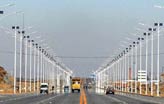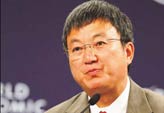Overseas students flock to language school
Updated: 2011-09-20 08:34
By Chen Jia (China Daily)
|
|||||||||
BEIJING - Adam Daniel Breuer-Zehevi is always motivated to get to his Chinese literature class on time.
"I have a business plan in Beijing, and Chinese language study is my final preparation before I open my translation company next year," the 28-year-old said.
Wearing a red shirt and jeans, Breuer-Zehevi looks like a typical foreign student at the School of Chinese Language and Literature under Beijing Foreign Studies University (BFSU).
This brilliant language student can conduct simultaneous interpreting in five languages: English, French, Hungarian, Hebrew and Chinese.
As a Hungarian Israeli, he was born in Israel but has lived in Hungary for 14 years and is already running a translation agency there.
Breuer-Zehevi studied Chinese in the Confucius Institute at Eotvos Lorand University from 2009 to 2010, and his passion for modern Chinese literature and history drove him to continue studying Chinese at BFSU.
"I can't wait to see what the real China and its people look like in the 21st century," Breuer-Zehevi said. "Chinese people are more open nowadays, money-oriented and hardworking.
"More and more Chinese have overseas experience; but they are still proud to be Chinese."
Breuer-Zehevi is among 1,500 overseas students at BFSU this year, an increase of 500 on the record number in 2008, according to Chen Yulu, the university president.
This year, South Korea has the most overseas students at the university, followed by Japan, Malaysia and Italy.
"We also enroll a lot of students from less-developed countries who have scholarships funded by the Chinese government," Chen said. "In China, only BFSU has the teaching and research resources of some less commonly taught languages, so students from these countries prefer our university."
Chen said the university plans to attract more students from Western countries for degree studies and foreign officials for short-term programs. "For overseas students who have difficulty speaking Chinese, we might start them off with courses taught in their native languages," he said.
"We also welcome overseas students who have learned some Chinese in our overseas Confucius Institutes and want to further their study in Beijing."
Edo Miyuki, a 22-year-old Japanese woman, the four-year Chinese course at BFSU should enable her to find a lucrative job in tourism management in Tokyo next year. "More Chinese are visiting Tokyo every year, and Japanese who can speak fluent Chinese are popular in the tourism employment market," she said.
"It's not an expensive investment for a Japanese family to support their children to study at Chinese universities, and I don't need a part-time job."
Edo said some of her friends chose to study in Beijing for various reasons, such as being in the city during the 2008 Beijing Olympic Games.
BFSU Time line
March 1941: The Russian language team was founded in the third branch of the Chinese People's Anti-Japanese Military and Political College in Yan'an. Later the team evolved into the Russian language section.
December 1941: The Russian language section evolved into the Russian Language Faculty of Yan'an Military Institute.
June 1942: Russian Language Faculty was turned into the Russian Language School of the military commission.
June 1944: Yan'an Foreign Languages School was founded when the English Language Faculty was merged into the Russian Language School.
January 1946: Teachers and students of the Yan'an Foreign Languages School who had arrived in Zhangjiakou founded the Foreign Languages Faculty in the Department of Literature and Art at North China Collegiate University.
June 1946: Teachers and students of the foreign languages personnel training class of the Jinchaji Military and Political Cadres' School joined the Foreign Languages Faculty at North China Collegiate University and the Foreign Languages Department was founded with the English and Russian faculties.
June 1948: Teachers and students of the English Language Faculty at North China Collegiate University founded the School of Foreign Affairs in Nanhaishan Village of Huolu county in central Hebei province.
August 1948: North China Collegiate University in the provinces of Shanxi, Chaha'er and Hebei merged with the University of the North in the provinces of Shanxi, Hebei, Shandong and Henan and North China University was founded. The Foreign Languages Department at North China Collegiate University was combined with the Foreign Language Class at the University of the North and the Foreign Languages Faculty of the Second Branch at North China University came into being.
June 1949: The Foreign Languages Faculty of the Second Branch of North China University merged with the School of Foreign Affairs to form the School of Foreign Languages.
October 1949: The Beijing Russian Language Specialized College was founded.
March 1950: The German Language Faculty and French Language Faculty were founded in the School of Foreign Languages.
February 1951: The Russian Language Faculty of the School of Foreign Languages was merged into Beijing Russian Language Specialized College.
August 1954: The School of Foreign Languages changed its name to Beijing Foreign Languages Institute.
June 1955: The Beijing Russian Language Specialized College changed its name to Beijing Russian Institute.
February 1959: The Beijing Russian Institute was assimilated into the Beijing Foreign Languages Institute and at that time there were six faculties with eight majors (English, Russian, German, French, Spanish, Polish, Czech and Romanian) and a Preparatory School for Further Studies in the Soviet Union.
September 1960: The International Student Office was established.
September 1964: Beijing Foreign Languages Institute became a specialized institute with the most languages in China, including six faculties (English, Russian, French, Spanish, Asian and African Languages and the Eastern European Languages) with 27 foreign languages (English, Russian, German, French, Spanish, Swedish, Portuguese, Italian, Japanese, Arabic, Vietnamese, Laos, Cambodian, Thai, Indonesian, Malay, Burmese, Sinhalese, Hausa, Swahili, Polish, Czech, Romanian, Hungarian, Bulgarian, Albanian and Serbian).
June 1966: The "cultural revolution" (1966-76) broke out and the institute was forced to suspend classes and enrollment of new students.
April 1970: The institute was moved to Shayang county of Hubei province and the institute founded the May Seventh Cadre School.
October 1971: As the institute resumed the enrollment of new students, the first group of 800 workers, peasants and soldiers were enrolled.
August 1972: The institute returned to Beijing.
October 1977: The first group of 256 students was enrolled into the institute after college entrance examinations resumed.
February 1979: The institute was mandated by the central government to train translators and interpreters for the UN and the UN-sponsored translator and interpreter training course was founded under the English Language Faculty.
August 1979: The Foreign Language Teaching and Research Press was founded.
February 1980: The resource center for foreign language teaching was set up.
December 1981: The Chinese language training program for foreign students was established.
September 1983: The institute established the foreign culture exchange course.
March 1984: The Institute of Foreign Literature Study and the Institute of Foreign Languages Study were founded.
September 1984: The Turkish language major was established and the number of foreign language majors reached 28.
September 1984: The Chinese language training program for foreign students was assimilated into the teaching and research section to become the Chinese Language Faculty.
September 1984: The UN-sponsored translator and interpreter training course was separated from the English Language Faculty to become the UN-sponsored translator and interpreter training program.
September 1984: The Beijing Foreign Language Audiovisual Teaching Material Press was founded.
October 1984: The institute founded the correspondence courses section with English, Russian, German, French, Japanese and Arabic majors.
September 1985: The Center of Japanese Studies and the training program for people going abroad were founded.
September/1985: The Faculty of Teaching Chinese as a Second Language and the Faculty of Library Information Management were established.
October 1985: The second faculty for the English language was established to ease the burden on the first one.
April 1992: The International Exchange Institute held the opening ceremony for its first batch of overseas students, which was composed of 74 Japanese students. In addition, the Continuing Education School was established and the correspondence courses section of the Evening University was cancelled.
February 1994: The institute changed its name into Beijing Foreign Studies University.
June 1994: The Graduate School of Translation and Interpretation (GSTI) was established and the UN-sponsored translator and interpreter training program was assimilated into it; the second faculty for the English language, the informatics major of English books and the training program for people going abroad merged to become the Department of Applied English.
October 1994: The Korean major under the Asian and African Languages Faculty launched courses.
November 1994: The Russian Language Faculty was renamed the School of Russian.
December 1994: The Counseling Center for Graduates was established.
January 1995: The Foreign Language Teaching and Research Press and the Beijing Foreign Language Audiovisual Teaching Material Press merged.
October 1999: The Institute of Online Education was established.
March 2000: The National Research Centre for Foreign Language Education and the Research Centre for European and American Literature were established.
September 2005: The International Exchange Center of BFSU was established.
April 2006: News Center was established.
November 2006: The School of Law was founded.
March 2007: BFSU added Dutch, Icelandic, Danish and Norwegian programs.
May 2007: The Office of Confucius Institute in BFSU was established.
September 2007: The School of Philosophy and Social Sciences was set up.
December 2007: The Information Center for Worldwide Asia Research and Tongwen Educational Center were established.
June 2008: The School of English for Specific Purposes was officially established.
July 2008: The Multilingual Service Center for the Olympic Games was launched.
April, 2009: Computer Science Department was established.
September, 2009: Center for Studies of Yi and Confucianism was founded.
August, 2010: Center for Public Diplomacy Studies was founded.
June, 2011: The BFSU Institute of Arts was founded.










